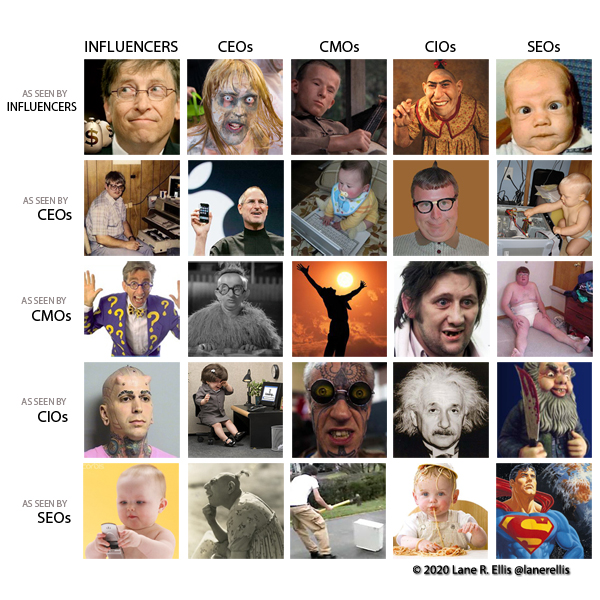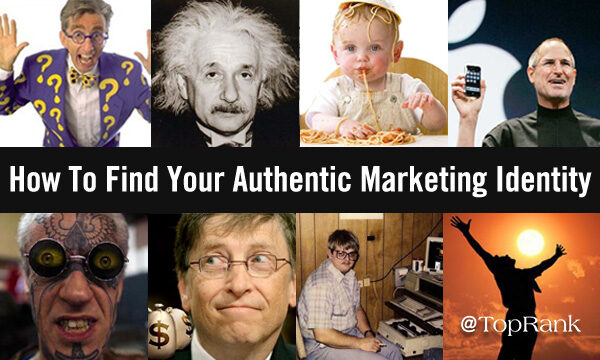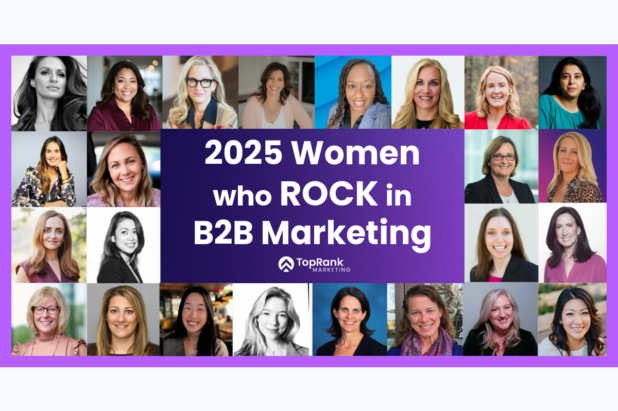What do you think of when you see a person’s business title, and how do the role assumptions we all inevitably bring to the table affect our ability to market authentically?
Can we find our own more effective and authentic marketing identity and build greater business communication opportunities by ditching preconceived role beliefs?
Marketing has seen dwindling levels of trust in recent years, and as our CEO Lee Odden observed in his recent “In Search of Trust: How Authentic Content Drives Customer Experience,” building great customer experiences is an uphill battle if customers don’t trust brand communications.
86 percent of customers have said that authenticity is important when deciding what brands they like and support, which ought to make marketing that resonates with truth a key goal among forward-thinking B2B marketers.
Understanding that we’re not interacting with businesses but with human beings is also especially important as we push towards 2021, as our senior content strategist Nick Nelson examined in “How Authentic Content Builds Brand Trust in Uncertain Times.”
So sit back and let’s explore how to find your most authentic marketing identity through the lens of authenticity when it comes to how we perceive the many professionals in our business lives.
Looking Anew At Our Universe of Business Associates
Back in 2011 during my decade as lead editor at search and social media conference Pubcon I created a grid image in a style that was popular at the time, making light-hearted fun at how some people in the world of technology might mistakenly view those in different segments of the industry.
It highlighted how we sometimes tend to see ourselves and others who hold the same positions that we do in generally more favorable light than how we view our associates who have differing roles.
Back then I included search engine optimizers, social media optimizers, social media marketers, chief executives, and affiliate marketers, and I thought it might be time for an update including chief marketing officers, chief information officers, and influencers.

While “To thine own self be true” is unmistakably sound Shakespearian wisdom, it’s also important to see others as they truly are — without the prejudice of weighty titles.
Being true to ourselves starts when we strip away preconceived notions of what a CMO does or what a CEO doesn’t do and look instead at the totality of each person — a shift that can begin a newfound level of productive communication in both our professional and personal lives.
After all, as Vanessa Colella, chief innovation officer at Citi, recently noted in an American Banker podcast, “We’re all the same size rectangle on the Zoom screen.”
Using A Fresh Understanding of Others To Learn More About Ourselves & Tell More Authentic Marketing Stories
We’re all so much more than mere titles — each of us is a fantastic and unique collection of strengths, weaknesses, and the cumulative collection of professional and personal journeys our lives have given us.
Our personal histories shape the stories we’re able to tell in our marketing, and making our storytelling authentic is a primary factor in making it successful.
“We’re all so much more than mere titles — each of us is a fantastic and unique collection of strengths, weaknesses, and the cumulative collection of professional and personal journeys our lives have given us.” — Lane R. Ellis @lanerellis Share on XLet’s now look at five tips for uncovering and putting your authentic marketing identity to work:
1 — Bring Measurement to Authentic Content Experiences
“Creating trust with authentic content experiences must be a measurable exercise,” Lee has urged. “Beyond share of voice and brand sentiment metrics, marketers must pay attention to measuring the effectiveness of content through the customer journey,” Lee added.
It’s not enough to infuse authenticity in top-notch digital content, as to truly understand the significance and success of our efforts we need to incorporate a measurement to gauge performance.
Measurement comes in many forms, from manual to automated solutions, and each can only tell you so much if you don’t have the proper key performance indicators (KPIs) relevant to your authentic campaigns. Albert Einstein offered insight that applies to marketing measurement and analytics, “Not everything that can be counted counts, and not everything that counts can be counted.”
We’ve explored how marketers can measure for success in a number of articles, including these to get you up to speed:
- How to Measure Changing Marketing Goals During a Crisis
- Measure for Success: 7 Secrets of Actionable Content Marketing Dashboards
- Measuring Content Marketing Success: Analytics Advice & Insight from the Experts
2 — Look to the Long-Term for Business Relationships
“Content marketing is inherently a long game, focused on building relationships first and foremost,” Nick has observed. “Right now, the best way to pursue this goal is through authenticity and altruism, in the context of your business and its audience,” he added.
Always-on marketing has become more important in efforts to build trust, strengthen relationships, and achieve ongoing long-term success — a trend we’ve explored recently since the launch of our groundbreaking 2020 State of B2B Influencer Marketing report.
“As the need for B2B brands to reach and connect authentically with customers rises, B2B influencer marketers are evolving from transactional and intermittent campaigns to more relationship driven, Always-On Influencer engagement programs,” Lee observed in “For Successful B2B Marketers The Engine of Influence is Always On #B2BIMReport.”
You can learn more about how always-on marketing benefits B2B marketers in the following additional articles we’ve published on the subject:
- Always On Influence: Costs Less and Better ROI – Here’s Why
- Always On Influence: Short Term vs. Long Term for Success During a Crisis
- Always On Influence: Definition and Why B2B Brands Need it to Succeed
- Always-On Influence: Why B2B Needs Brand Research
- Always-On Influence: 5 Examples of Ongoing B2B Influencer Marketing In Action
3 — Bring Authenticity to Every Facet of Your Life
Authenticity matters everywhere in our lives, and leading a life where we’re as authentic as possible in all areas makes it easier and more natural to incorporate it into our marketing efforts.
Unforgettable marketing and best-answer marketing often go hand-in-hand, both filled with the kind of authenticity and genuine emotion that builds especially strong brand affinity.
“Authenticity is a collection of choices that we have to make every day. It’s about the choice to show up and be real. The choice to be honest. The choice to let our true selves be seen,” author Brené Brown has observed.
“Building authenticity can be accomplished by sharing the kind of best-answer content that your audience is actively searching for.” — Lane R. Ellis @lanerellis Share on X4 — Purpose & Authenticity Go Hand-in-Hand
“Building a purpose-driven authentic brand brings growth,” Lee has observed, and during this year more than others brands have had to take a close look at their purpose and how they are pushing beyond words and into the realm of taking action.
In “B2B Brands Take a Stand: 5 Examples of Going Beyond Words to Action,” I examined at why it’s never been more important for brands to show purpose and to be connected to what’s important to customers, and seeing others and ourselves authentically can certainly go a long way in making this happen.
“Don't mistake good communication for action. There is a really big difference.” Karen Kahn of @HP Share on X5 — Authenticity Builds Mutually Beneficial Programs
In B2B influencer marketing programs, cooperative marketing efforts serve to benefit both brands and influencers, as Dan Gingiss, chief experience officer at The Experience Maker recently examined in our influencer marketing strategist Debbie Friez’ “B2B Influencer Marketing Advice from 9 Top B2B Influencers.”
Whether working with influencers or in more traditional marketing efforts, authenticity cuts to the heart of what drives the type of brand storytelling that truly connects with customers.
It’s also the kind of authentic digital storytelling that is remembered well beyond the two seconds that recent research suggests is all marketers are likely to get these days — see “You get 2 seconds to engage consumers online: Mars neuroscientist shares key findings.”
“The best influencer programs highlight an authentic relationship between the influencer and the brand, and the best way to accomplish that is to ensure a mutually beneficial program.” — Dan Ginigiss @dgingiss Share on XAuthenticity Energizes Marketing & Our Personal Journeys
Being authentic and true to ourselves is a process that can shift over time, requiring occasional reevaluation and possible adjustments to how we live and work. We hope these five tips for uncovering and putting your authentic marketing identity to work serve you well in your own personal journey.
Finally, to further your insight into authenticity in B2B marketing — a subject we’ve explored over time — here are several helpful takes on how you can harness its power in your marketing efforts:
- In Search of Trust: How Authentic Content Drives Customer Experience
- How Authentic Content Builds Brand Trust in Uncertain Times
- Authenticity and Great B2B Content Marketing Go Hand In Hand
- For Successful B2B Marketers The Engine of Influence is Always On #B2BIMReport
- B2B Brands Take a Stand: 5 Examples of Going Beyond Words to Action
- B2B Influencer Marketing Advice from 9 Top B2B Influencers
Implementing a successful authentic marketing program takes time, effort, and dedicated strategy, which leads many brands to use a top B2B influencer marketing agency such as TopRank Marketing, which was the only B2B marketing agency offering influencer marketing as a top capability in Forrester’s “B2B Marketing Agencies, North America” report.



